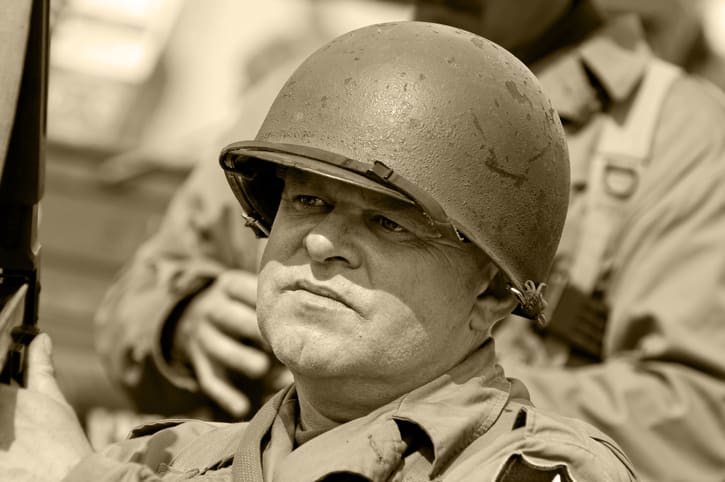It was a sunny November day in Netanya, with a gentle breeze wafting in from the Mediterranean. My wife, mother and I were there for a short vacation, and we decided to visit a neighborhood cafe. It was late in the afternoon, and the locals were starting to arrive.
The waitress offered us a table inside, but we declined, since loud music was blaring from speakers on the wall, and the TV was on. We preferred the relative quiet of an outdoor table. The waitress brought us some drinks, and I was thoroughly enjoying my cappuccino.
That’s when I noticed him. He was an older gentleman, probably in his upper seventies. He was on the heavy side, had large tinted glasses and wore a baseball cap. He was two tables away from us, and had just finished reading the paper. We caught each other’s eyes, and nodded politely to one another.
Suddenly I started hearing music. Rats, I thought. We had picked this table to avoid the intrusive music inside the cafe, only to get more music outside. It made it harder to have a good conversation. Where was it coming from? Besides, it sounded rather mournful, too.
I tried to locate the source of the dirge-like music, and then I noticed the old man was playing with his cell phone, and looking over at me. His cellphone – that’s where the music was coming from. He was listening to some kind of show on his phone, and had turned it way up. It seemed a little rude and annoying, but my family and I did our best to ignore it and continue shmoozing.
Apparently that wasn’t good enough for him. He had decided I had to hear what he was listening to. He got up from his chair, walked over to me, and began speaking to me in Hebrew.
“Ani rotzeh shtishma lashir hazeh” – I want you to hear this song.
I looked at him in surprise. Why did he come over to me, a perfect stranger? I wasn’t really in the mood for the sad music, and I was really having a fine conversation with my family.
But the man was insistent.
“Ok,” I said. “Aval mah zeh?” What is it?
He thrust his cellphone onto my table, right in front of me.
“Tishma” – listen!
I looked at my mom, then at my wife, and shrugged. This must have been really important to the man.
“Bseder, ani akshiv” – Ok, I’ll listen.
Was that a tear I saw in his eyes?
I noticed that nobody else at the cafe seemed to care what was going on. Maybe they were used to him.
I now gave his phone my full attention. On the screen was a man in an IDF uniform, singing into a microphone. He had a beautiful voice. Behind him was a choir of IDF soldiers.
“Sim lev lamilim!” said the old man. “Pay attention to the words!”
I realized that the singer was the chief chazzan (cantor) of the IDF, and he was singing the Mi Shebeirach L’Chayalei Tzahal – the prayer for God’s protection of the soldiers of the IDF. It was a prayer that I value deeply, but had never heard sung before; usually it is recited in the synagogue, but not in any particular tune. The melody was haunting and beautiful. I was very moved.
I thanked him and told him how much I loved the song. I walked him back to his table and we sat down for a few minutes. Those indeed had been tears in his eyes.
“Ani mayniach she’hayita b’Tzahal” – I assume you were in the IDF, I said.
He smiled. “Betach!” – of course.
“Mah asita?” – What did you do in the army?
Another smile. “Gidalti Tzanchanim” – I raised paratroopers.
He went on to say that he was a retired lieutenant colonel in the vaunted IDF paratroops, and had fought in every major war since the Six Day War, in which he was among the liberators of Jerusalem. He had trained generations of combat soldiers along the way.
The man was a hero, and had risked his life countless times for our people.
And here I was, getting annoyed at the intrusion.
I now realized that this hero, now spending his retirement years in a resort town, was deeply connected to his glorious past of defending his country and fighting in its battles. But more. He recognized God’s protection, and the need for our prayers to protect Israel’s brave soldiers.
I thanked him profusely for his army service, and for sharing the beautiful music with us. He seemed grateful that my family and I appreciated the heartfelt rendition of the special prayer. We shook hands, and then my family and I left the cafe.
But on my way out, I stole one last glance at the old soldier.
He was already lost in his thoughts. About past battles. About his soldiers in harm’s way. About God’s protection.
To think I nearly missed this opportunity. To meet one of the ordinary heroes of Israel.
Shlomo Horwitz is the founding director of Jewish Crossroads, an educational theater project that has provided creative Torah programming across the US, Canada, England and Israel. He studied at Yeshivat Shaalvim and Yeshivat Ner Yisrael in Baltimore, where he received ordination from Rabbi Yaakov Weinberg. Shlomo is a CPA and a director of a consulting firm near Washington, DC. He can be reached through his site, www.jewishcrossroads.com.
The words of this author reflect his/her own opinions and do not necessarily represent the official position of the Orthodox Union.

